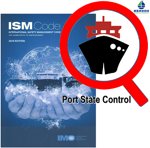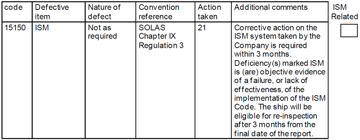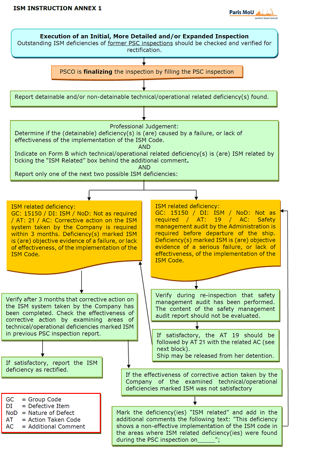 Guidelines for the Port State Control (PSC) on the ISM Code 08.06.2024 19:11
Guidelines for the Port State Control (PSC) on the ISM Code 08.06.2024 19:11Paris MoU has published guidelines to provide guidance for the harmonized reporting and follow up of ISM deficiencies in the scope of a PSC inspection, for the Port State Control Officers (PSCOs).
During the initial PSC inspection, the PSCO should verify that the ship carries the ISM certificates according to SOLAS Chapter IX and the ISM Code by examining the copy of the DOC and the SMC, for which the following points are to be considered:
1) A copy of the DOC should be on board. However, according to SOLAS, the copy of the DOC is not required to be authenticated or certified.
The copy of the DOC should have the required endorsements.
2) The SMC is not valid unless the operating Company holds a valid DOC for that ship type. The ship type in the SMC should be included in the DOC and the Company’s particulars should be the same on both the DOC and the SMC.
The SMC should have the required endorsements.
3) The validity of an Interim DOC should not exceed a period of 12 months.
The validity of an Interim SMC should not exceed a period of 6 months.
In special cases, the Administration, or at the request of the Administration another Government, may extend the validity of the Interim SMC for a period, which should not exceed 6 months from the date of expiry.
4) ROs may issue a short term DOC or SMC not exceeding 5 months, whilst the full term certificate is being prepared in accordance with their internal procedures.
5) If a renewal verification has been completed and a new SMC cannot be issued or placed on board the ship before the expiry date of the existing certificate, the Administration or RO may endorse the existing certificate. Such a certificate should be accepted as valid for a further period which should not exceed 5 months from the expiry date.
6) If a ship at the time when a SMC expires is not in a port in which it is to be verified, the Administration may extend the period of validity of the SMC but this extension should be granted only for the purpose of allowing the ship to complete its voyage to the port in which it is to be verified, and then only in cases where it appears proper and reasonable to do so.
No SMC should be extended for a period of longer than 3 months, and the ship to which an extension is granted should not, on its arrival in the port in which it is to be verified, be entitled by virtue of such extension to leave that port without having a new SMC. When the renewal verification is completed, the new SMC should be valid to a date not exceeding 5 years from the expiry date of the existing SMC before the extension was granted.

If a more detailed inspection is carried out, this should be done in accordance with the PMoU procedures. Any technical and/or operational related deficiencies found during this inspection should be, individually or collectively considered by the PSCO, using their professional judgement, to indicate that either:
a. these do not indicate a failure, or lack of effectiveness, of the implementation of the ISM Code; or
b. there is a failure, or lack of effectiveness, of the implementation of the ISM Code;
If an outstanding ISM deficiency with code 15150, defective item ISM and action taken code 21 from a previous PSC inspection exists and the current PSC inspection is more than 3 months later, the PSCO will verify during the present PSC inspection the effectiveness of any corrective action taken by the Company by examining the technical and/or operational related deficiencies (marked “ISM”) of the previous PSC inspection report which led to the issuance of the ISM deficiency.
Example PSC Inspection Report:
The Flowchart below shows the process of Execution of an Initial, More Detailed and/or Expanded Inspection:


